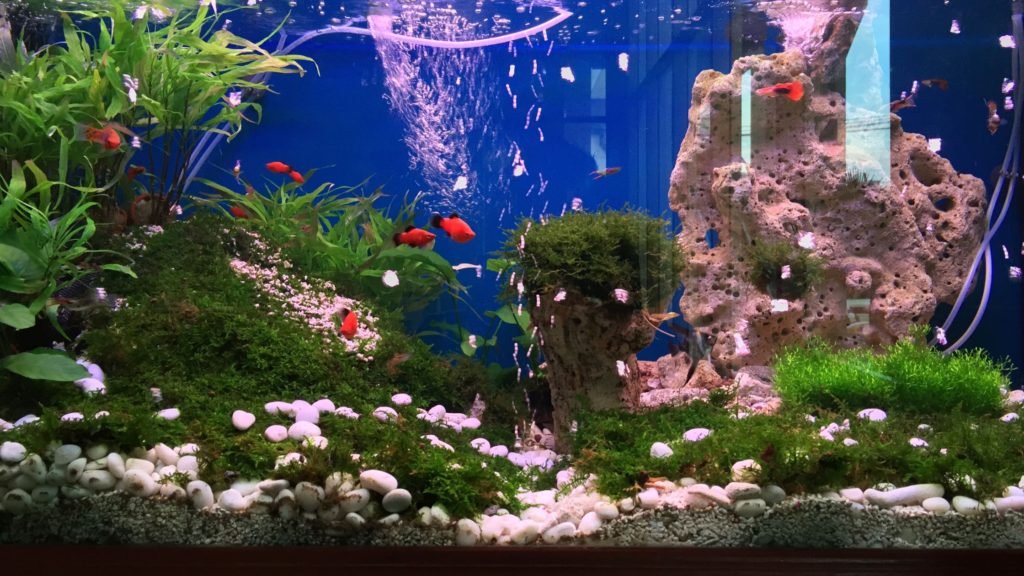Regarding the intriguing world of aquatic life, countless mysteries baffle fish owners. One such intriguing question is: Do fish sleep? As simple as it may sound, this question opens up a plethora of fascinating considerations about fish’s sleep habits and patterns.
Understanding Fish Sleep Patterns
Fish, like all living creatures, need rest. However, their rest looks different from ours. While humans lie down, close their eyes, and become immobile when they sleep, fish do something different. But what does fish sleep look like? Understanding their unique sleep patterns is crucial to answering our primary question: “Do fish sleep?“
Fish don’t have eyelids (except for some shark species). That means they can’t close their eyes like when we sleep. So, how do you know if a fish is sleeping? There are several signs to look for. Fish typically reduce their activity and stay close to the bottom of the tank during their rest period. They may change their color slightly to blend better with their surroundings, giving them a sense of security while resting.
Do Fish Sleep at Night?
Fish sleep is less about night and day and more about active and restful periods. Many fish are diurnal, meaning they’re busy during the day and rest at night, similar to humans. Yet, there are also nocturnal fish species, like some catfish and sharks, that flip this pattern on its head. These fish rest during the day and become active at night, like owls or bats in the animal kingdom.
Whether diurnal or nocturnal, all fish need rest periods to function correctly. During these periods, they’re less responsive to stimuli but can quickly wake up if threatened. This rapid wakefulness is crucial in the wild, where danger can strike anytime.
Fish Sleeping Time: Is There a Fixed Duration?
The length of a fish’s rest period can vary greatly depending on the species. Some fish may rest for only a few hours, while others may seem inactive for up to 12 hours. Environmental factors, such as the availability of food, light levels, and water temperature, can also influence a fish’s rest duration.
It’s important to note that fish don’t follow a strict sleep schedule like humans. They don’t have a deep sleep phase or REM sleep, where dreaming occurs in people. Instead, they have rest periods where they remain alert to potential threats. This state is sometimes referred to as “resting vigilance.”
Fish Sleep Upside Down: Is It Normal?
While seeing a fish sleeping upside down may alarm some fish owners, it’s essential to understand that this behavior is not typical and could be a sign of illness. A healthy fish usually rests near the bottom of the tank or nestles in a plant, remaining upright or at a slight angle. If a fish consistently sleeps or swims upside down, it might suffer from swim bladder disease, affecting its buoyancy. If you notice this behavior, it’s best to consult a fish health professional to identify the appropriate treatment.
Should I Turn off the Aquarium Light at Night?
For fish owners, understanding the sleep patterns of their aquatic pets is crucial, as it directly impacts how they should manage their fish tank environment. One common query is whether or not to turn off the aquarium light at night.
The answer is yes. Turning off the aquarium light at night can be beneficial for fish. A consistent light-dark cycle mimics the natural environment and helps fish establish a routine. Having the light on continuously can stress fish, potentially leading to health issues. However, complete darkness may not be necessary, and a dim night light can be used, especially for fish afraid of the dark.
When to Turn off Fish Tank Light
The best time to turn off the fish tank light is when it gets dark outside, helping maintain a natural day-night cycle. Similarly, the light should be turned back on in the morning. Most fish benefit from about 8 to 12 hours of light daily, including natural and artificial light.
Fish owners can use automatic timers for their aquarium lights to maintain a consistent cycle without forgetting to turn them on and off daily. That can also be helpful if you’re away from home for an extended period.
Should You Leave the Fish Tank Light on 24/7?
Leaving the fish tank light on 24/7 might seem appealing, as it provides constant visibility into the tank, and some may believe it benefits the fish. However, leaving the light on continuously can cause numerous problems.
Like humans and many other animals, fish have internal biological clocks, known as circadian rhythms, that regulate their sleeping and feeding patterns. Constant light can disrupt these rhythms, causing stress and potentially leading to health issues such as weakened immune systems or changes in behavior. It can also encourage the growth of algae, which can overpopulate the tank and disrupt its ecological balance.
Balancing Sleep and Activity in Fish
Fish do not sleep like humans, but they enter rest periods where they are less active, their metabolism slows down, and their response to stimuli decreases. These rest periods are essential for their health and well-being.
During these resting periods, fish often seek out a safe spot in the tank, such as an aperture, the underside of a leaf, or a specially designed fish cave. Some fish also change colors during rest periods to blend in with their surroundings and avoid predators.
Respecting these rest periods and not disturbing your fish during their downtime is essential. Maintain your fish tank during their active periods to keep them healthy.
FAQs About Fish Sleeping Habits
Do All Fish Sleep the Same Way?
No, different species have different sleep habits. Some float in place, others nestle into the substrate or find a hiding spot, and some even sleep while swimming!
Do Fish Sleep Upside Down?
Only rarely. If you see your fish floating upside down, it’s more likely to be a sign of swim bladder disease, not sleep. If your fish displays this behavior, consult a vet or aquarium expert.
How Can I Tell if My Fish Is Sleeping?
Fish don’t close their eyes when they sleep, so it can be hard to tell. Signs of a sleeping fish include reduced activity and a change in color to a duller shade. Some fish also “hover” in one spot when sleeping.
What Happens if Fish Don’t Get Enough Sleep?
Like humans, fish can get stressed and sick if they don’t sleep enough. Chronic sleep deprivation can weaken their immune system and make them more susceptible to diseases.
Can Fish Suffer from Sleep Disorders?
While it’s hard to diagnose sleep disorders in fish, changes in their sleeping habits can signal stress or illness. If your fish’s behavior changes dramatically, it may be time to consult an expert.
To wrap it up, fish do sleep, but not how we usually understand sleep. Their sleep is a rest period where they lower their activities but stay alert to potential dangers. It’s crucial as fish owners to understand this and create an environment that allows our aquatic friends to have this rest period. Always remember that a healthy sleep pattern indicates a healthy fish!
Maintaining a Healthy Environment for Fish Sleep
Now that we understand the basics of fish sleep, we must ensure their tank environment supports their natural resting habits. Here’s how you can do that:
Provide Hiding Places
Fish like to feel safe when they sleep. Adding plants, rocks, and other structures to your aquarium can provide them with plenty of places to hide and rest.
Control Light and Noise
As mentioned, it’s essential to manage the lighting in your tank to mimic natural day-night cycles. Additionally, reduce the noise around your fish tank, especially during sleep.
Check Water Parameters
Ensure your water parameters like temperature, pH, and ammonia levels are within the recommended range for your specific fish species. High ammonia levels can cause stress, which can disrupt sleep.
Creating a Sleep-Friendly Environment in Your Aquarium
Maintain a Consistent Light-Dark Cycle
Like humans, fish have a circadian rhythm influenced by light and dark cycles. Aim to replicate a natural day-night process in your tank to ensure your fish get the sleep they need. That could mean turning off the aquarium light at night and providing the room is dark. Too much light can mess up their sleep cycle and cause stress.
Provide Plenty of Hideouts
Fish feel safer when they have a place to hide, especially when they sleep. Make sure your aquarium has enough plants, rocks, and caves for your fish to hide in. Some fish also like to burrow in the substrate to sleep, so consider this when choosing the type of substrate for your tank.
Keep Noise and Vibrations to a Minimum
Fish are sensitive to vibrations and noise, which can disrupt their sleep. Keep your aquarium in a quiet part of the house, and avoid tapping on the glass or making loud noises near the tank.
Monitor Water Quality
Poor water quality can stress fish and disrupt their sleep. Regularly test your water for ammonia, nitrites, nitrates, pH, and temperature. Adjust these within the optimal range for your specific type of fish.
Understanding and respecting the sleep patterns of your fish can significantly contribute to their overall health and longevity. If you notice any drastic changes in your fish’s behavior or sleep patterns, it’s best to consult with a fish care expert or vet. Remember, a well-rested fish is a happy and healthy fish!
Related Articles

Mastering the Art of Dog Training: How to Train Your Dog to Stop Barking
Introduction to Dog Barking Barking is an inherent characteristic of dogs, serving as a

How to Clean Goldendoodle Ears: Preventing Infections
Welcome to our essential guide on how to clean Goldendoodle ears. As every doodle

Top Picks: Best Harness for Goldendoodle Revealed!
Welcome to our comprehensive guide on finding the best harness for your Goldendoodle! After

